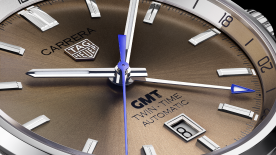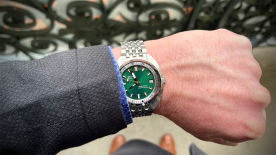Worldtempus: After five years of tackling specific notions of time, this is the first time that the forum looks specifically to the future. How do you define the topic for the forum each year and what factors do you consider? How did "What's next?" emerge as the theme for this year?
Fabienne Lupo: The first five Forums de la Haute Horlogerie explored different “times”: time to change, time to rethink, time to act, time to share and a “time of paradox”, thus laying the groundwork for a reflection on what tomorrow holds.
And so is “What’s Next”, the theme of this 6th Forum. Generations, technologies, markets… new horizons, new stakeholders and new challenges for which we must be prepared. Tomorrow’s world will have a different face to the world of today, and while we are simply imagining what this face might be, young generations are making it happen.
These are the legitimate questions which this Forum de la Haute Horlogerie sets out to answer through an analysis of this new environment and its main protagonists, namely the new generation who carry our hopes without being afraid to challenge them. “What’s Next?” is clearly the question we need to ask.
How do you see the FHH's role in helping members to educate and communicate with the "millenials", the haute horlogerie customers of tomorrow? Do you think all watch brands are aware of this and prepared?
The millenials, this new emerging generation, are the future customers of our brands and they live a very different life compared with previous generations in terms of their identity, their imagination, attitudes and consumer behaviour. They were born with the Internet and cannot imagine life without being “connected”.
It is therefore all the more important for watch brands to explain what is behind the scenes, what lies beneath the dial of a mechanical watch and the cultural and scientific values that make Haute Horlogerie a world apart.
This is particularly important for younger generations who have grown up with electronics and it explains the efforts by luxury brands and watchmakers to set up a presence on new media like social networks in order to interact and establish a dialogue with this new generation.
Furthermore, we specifically chose this year to open the forum up to the millenials themselves, inviting young students selected by the partner schools of the Foundation (EPFL, EHL, ECAL, HEG, HES, HEC and “Sup de Luxe”), which will undoubtedly provide the opportunity for some interesting exchanges of ideas.
The Forum de la Haute Horlogerie is not afraid to tackle the burning issue of smartwatches. But do you consider these a genuine threat to haute horlogerie, or can the two co-exist on the wrist?
From all that we have heard since Apple presented its smartwatch, I think that we can draw a few interesting conclusions. On the whole, these new products do not offer any real advantages over a smartphone other than that they are more “immediate” because they are worn on the wrist. And this will always be the case, regardless of their design. There are also still two big question marks regarding their operation, namely their battery life and water resistance. But these smartwatches will undoubtedly open up new markets and will become a competitor to what we could call the entry-level watches.
Are they a threat to Haute Horlogerie? I weigh my answer carefully because we are not talking about the same type of products. Of course, smartwatches display the time and do much more besides but they do not meet the same needs or desires. I would say it is more a question of the battle for the wrist! These smartwatches are closer to computers with their “useful” functions, while on the other hand we are talking about timepieces that use traditional techniques and incorporate true craftsmanship. The debate about this will be interesting because nobody can predict the future. We need to remain vigilant!






